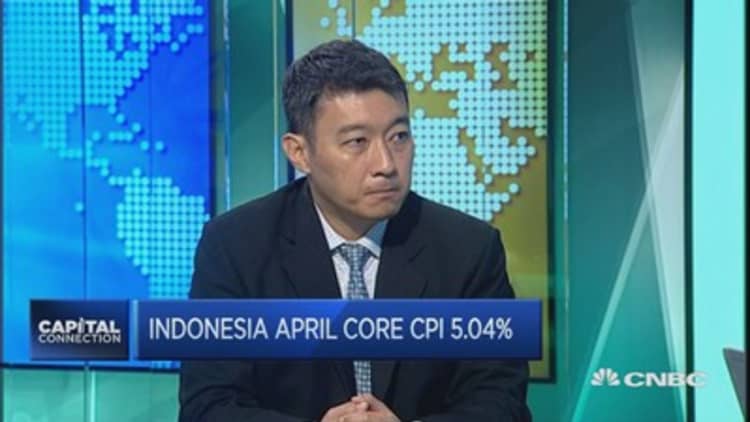Asian shares pared losses and edged up on Monday, as less-than-stellar data from China fueled bets that Beijing will unveil further support measures to prop up its stumbling economy.
The HSBC final purchasing managers' index (PMI) showed China's vast factory sector stalling in contraction for April, with a reading of 48.9, marking its fastest drop in a year. China's official PMI for April topped expectations, coming in at 50.1 last Friday, while HSBC's preliminary reading, released April 22, fell to 49.2. A reading below 50 indicates contraction.
Meanwhile, trading may be light with markets in Japan, Malaysia and Thailand closed for public holidays.
On Friday, Wall Street recovered from a previous selloff to bounce back sharply. The tech-heavy Nasdaq led gains with a 1.3 percent rally, as investors snapped up beaten-down shares in the tech sector. The and the S&P 500 finished 1 percent higher, respectively.
Shanghai Comp rises 0.9%
China's index erased early losses to finish in positive terrain, after posting a sharp drop as much as 1.2 percent following the tepid HSBC PMI figure in the morning session. The rebound was largely attributable to hopes of fresh government stimulus, experts said.
"The economy is weaker than the government estimated. Last week you already heard about more fiscal spending and most people expect more monetary easing this quarter so that should be more supportive of markets," Francis Cheung, head of China & HK Strategy at CLSA, said. "While I'm worried about how fast the market has gone up, valuations are still reasonable - about 16x forward P/E. We might get into [bubble territory], but the authorities will be proactive in managing that, with memories of 2007 still fresh."
Construction and infrastructure-related counters drew large buy orders; China State Construction and China Shipbuilding Industry Corporation jumped by the daily maximum allowable of 10 percent each, while China State Shipbuilding Corporation climbed 7.8 percent.
Banks and brokerage houses were among the day's laggards; Citic Securities and China Merchants Securities plunged 1.8 and 2.5 percent each, while Founder Securities tanked 1.5 percent.
Read MoreHas China dodged property Armageddon again?
Meanwhile, Hong Kong's Hang Seng index hovered in neutral territory amid choppy trade.
Fosun international jumped 7.5 percent on news that it has offered to buy the 80 percent stake of U.S. insurer Ironshore for $1.8 billion.
Casino play Sands China soared 3.2 percent despite delivering a 54.2 percent slump in first-quarter profit.
ASX adds 0.2%
Australia's S&P ASX 200 index closed up on Monday, but advances were limited by the banking sector that was heavily-hit by Westpac's weaker-than-expected results. A wait-and-see mood also dominated the market prior to the Reserve Bank of Australia's policy decision tomorrow.
The country's second-biggest lender by market value reported a flat half-year profit before the market open and shares plunged 3 percent. Markets took Westpac's results as a bad omen, resulting in a selloff in other major lenders such as Australia and New Zealand Banking, Commonwealth Bank of Australia and National Australia Bank, which were down between 1 and 2.7 percent.
"The big four banks will deliver anywhere from 3-5 percent on earnings... The biggest risk for banks is regulatory and their asset books, which is highly leveraged on loans, both in the residential and corporate sectors. If you get correction in housing or a slowdown in China, they are bound to take a hit," Kumar Palghat, director at Kapstream, told CNBC's "The Rundown."
Meanwhile, resources contractor Worley Parsons plummeted 9.6 percent after announcing a write-down and and plans to slash its international workforce by 2,000 people.
Read MoreAustralia rates, US jobs are key market risks this week
Kospi gains 0.2%
South Korea's Kospi index broke a five-day losing streak amid rangebound trade, following an extended weekend due to last Friday's Labor Day holiday. The Seoul bourse will be closed again tomorrow because of Children's Day.
Banks and automakers led the bourse higher; heavyweight component KB Financial closed up 1.8 percent, while Shinhan Financial and Woori Bank rallied 4 percent each.Hyundai Motor and Kia Motors leaped 1.8 and 2.4 percent, respectively, despite seeing a 1 percent fall in April's car sales.
Due to release first-quarter earnings on Wednesday, SK Telecom settled 1.9 percent lower.

Jakarta Composite jumps 1.1%
Indonesian shares made advances on Monday after annual inflation data rose 6.79 percent last month, nearly in line with Reuters expectations, on the back of rising food prices and as investors looked ahead to the first-quarter gross domestic product (GDP) due on Tuesday.
Reuters economists expect the country's economic growth to slow to 4.95 percent on-year for the first three months of 2015.
Since April 24, the benchmark Jakarta Composite has nosedived 6.57 percent as corporate earnings lagged expectations, while the rupiah has slid nearly 5 percent year to date.
"For the longest time, Indonesia has been the darling of markets, but it has now come to an end given the potential U.S. rate hike. We are seeing the gradual weakening of the rupiah and the profit-taking that we saw last week [will likely continue] for the next 12-24 months," Sani Hamid, director of wealth management, economy & market strategy at Financial Alliance, told CNBC's "Capital Connection."
"The central bank has very little room to reduce rates and if the rupiah starts to weaken further, they could even raise rates to stop capital outflow. so Indonesian markets are really on the back foot now," Hamid added.

